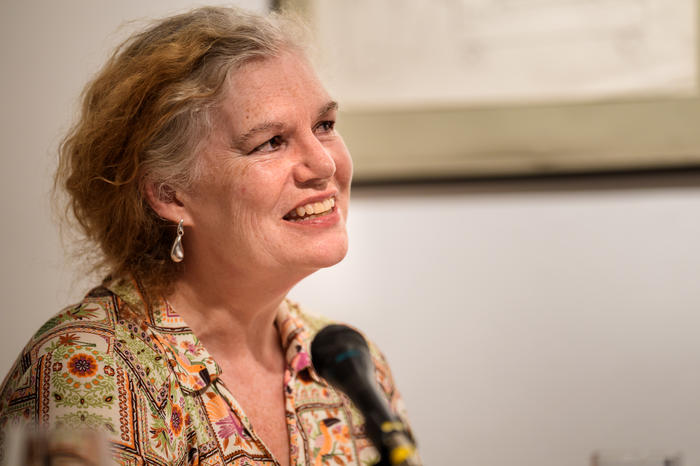The Einstein BUA/Oxford Visiting Fellowship: A Case Study in Successful Collaboration
One of the key advantages of the Berlin University Alliance’s strategic partnerships is the networking among researchers and the shared use of two research ecosystems. The Oxford–Berlin scientific collaboration, for example, facilitates exchange between the Oxford and Berlin research hubs through a range of programs. One such initiative is the Einstein BUA/Oxford Visiting Fellowship, launched in partnership with the Einstein Foundation Berlin.
Karen Leeder holds the Schwarz-Taylor Chair of German Language and Literature at Oxford University, where she specializes in contemporary German literature and poetry. In 2023, Leeder came to Berlin as an Einstein BUA/Oxford Visiting Fellow, where she is conducting research at the Freie Universität over a total of three years. The fellowship, jointly launched by the Berlin University Alliance (BUA) and the Einstein Foundation Berlin (ESB), aims to integrate top Oxford scholars into Berlin’s research landscape for the long term and to strengthen the Oxford–Berlin scientific collaboration. “It seemed like a fantastic opportunity to spend an extended period in Berlin and truly become part of the city’s academic and literary life,” Leeder recalls.
As a visiting fellow, Leeder leads the project AfterWords, which is funded until the end of 2025 within the Berlin Excellence Cluster Temporal Communities. “AfterWords explores the concept of afterness.” In literary studies, it describes the feeling of coming afterward, of existing in the shadow of what came before,” explains Leeder. At its core, the project develops a new theoretical approach to 20th- and 21st-century German-language poetry, based on the ideas of temporality, delay, and afterness.
A milestone for AfterWords, according to Leeder, was an experimental seminar in its second year, conducted simultaneously in Oxford and Berlin, focusing on contemporary German poetry. “The seminar concluded with a conference at New College, Oxford, featuring many excellent short talks on afterlives, belatedness, and afterness, where students and doctoral researchers from Berlin and Oxford could meet and exchange ideas. Both the seminar and the final conference were a great success,” she notes.
One of the highlights of the past two and a half years, she says, has been the many events organized by her team, bringing creatives and academics together. Leeder emphasizes the importance of extending her research beyond the purely academic sphere and connecting it to Berlin’s creative life. “AfterWords is a partnership between academia and the creative scene,” she stresses. “In that regard, the fellowship program has given me a great deal of freedom.”
These events also featured internationally renowned writers, including several whose works Leeder had previously translated into English. Her translations have won numerous awards; most recently, in June 2025, she received the Griffin Poetry Prize, the world’s most prestigious poetry award, for her translation of Durs Grünbein’s Psyche Running.
Leeder is currently working intensively on a new book. “I think it will be a collection of essays around the concept of afterness—with references to German poetry but from many different perspectives,” she says. This will serve as the final output of the AfterWords project, which is now entering its closing phase. However, for Leeder, AfterWords is far from over. “I am already planning two books on Rainer Maria Rilke’s English legacy, which will essentially be AfterWords books as well. The concept will continue to guide my work.”

